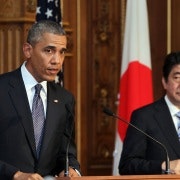The delicate Abe-Obama balancing act
Wall Street Journal
This city, like other capitals around the world, watched this week as U.S. President Barack Obama suffered major Democratic Party losses at the polls. The result -- a “weakened” U.S. government, as some Japanese media are labelling it -- will deepen the perception that US allies must do more on their own to help maintain stability in Asia.
Next week's Asia-Pacific Economic Cooperation summit in Beijing will thus carry more importance than most such gatherings. It will be the first time that America's lame-duck president meets his counterparts.
China's President Xi Jinping, as host, may sense an opportunity to press Beijing's advantage on matters ranging from the proposed Asian Infrastructure Investment Bank to insisting on unilateral political mechanisms for dealing with territorial disputes. If so, Mr. Obama will be expected to respond or be perceived as further faltering in influence.
Japan's Prime Minister Shinzo Abe will also face a delicate balancing act. He has demonstrated his desire to meet with Mr. Xi to boost Sino-Japanese relations, yet he will do as much as possible to strengthen the US-Japanese alliance and increase Japan's influence in Asia.
Mr. Abe must decide how strongly to tie himself to the weakened US president, especially if other leaders seem to be manoeuvering around him. The leaders of the US and Japan haven't had the warmest relationship recently, and ties could weaken further if Americans feel that Mr. Abe is already looking beyond the remaining two years of Mr. Obama's presidency.
Mr. Abe must also consider how hard he wants to push for a meeting with Mr. Xi. Officials in Tokyo seem optimistic about the chances for dialogue, but they recognize that no discussion is likely to achieve a breakthrough. The goal rather is to get the two sides talking again after nearly two years of frozen ties.
Yet Mr. Abe won't move on the issues most important to Mr. Xi, from acknowledging a dispute over the Senkaku Islands to pledging not to visit the controversial Yasukuni Shrine. If anything, Mr. Abe may seek to make Japan's expanded role in Asia look like the new normal, including security outreach to Southeast Asian nations and opposition to China's initiatives, including the new infrastructure bank. This stance would undoubtedly make it more difficult to restart Sino-Japanese relations.
The repudiation of Mr. Obama's policies by the American electorate plays into a larger trope about America's future in Asia. A vote for the Republican Party could be interpreted abroad as a desire by Americans for a smaller and more pro-business government that could revive US economic strength in the face of China's growth. Yet the election results could also be seen as evidence of a US political system that remains deadlocked and unlikely to solve its problems.
Mr. Obama could forestall some of these concerns by committing to concluding the Trans-Pacific Partnership trade pact and also announcing plans to end defence-budget cuts. Without a clear agenda from the US leader, however, Mr. Abe and other Asian politicians will see Washington as less of a player in their regional future.
Either way, Mr. Obama will play a weak hand at next week's summit. Mr. Xi is certain to dominate the spotlight and try to cement the impression that China is achieving dominance in Asia. America's allies will be put on the spot to defend their relationship with a country perceived to have declining influence. Ambitious leaders like Mr. Abe, in turn, may feel increasingly obligated to start carving out spheres of influence that subtly seek to operate independently of the US. The result will be an Asia that continues to move into a new era.
Mr. Auslin is a resident scholar at the American Enterprise Institute and a columnist for wsj.com. He is on Twitter @michaelauslin.
This article was originally published in the Wall Street Journal. Reproduced with permission.
















